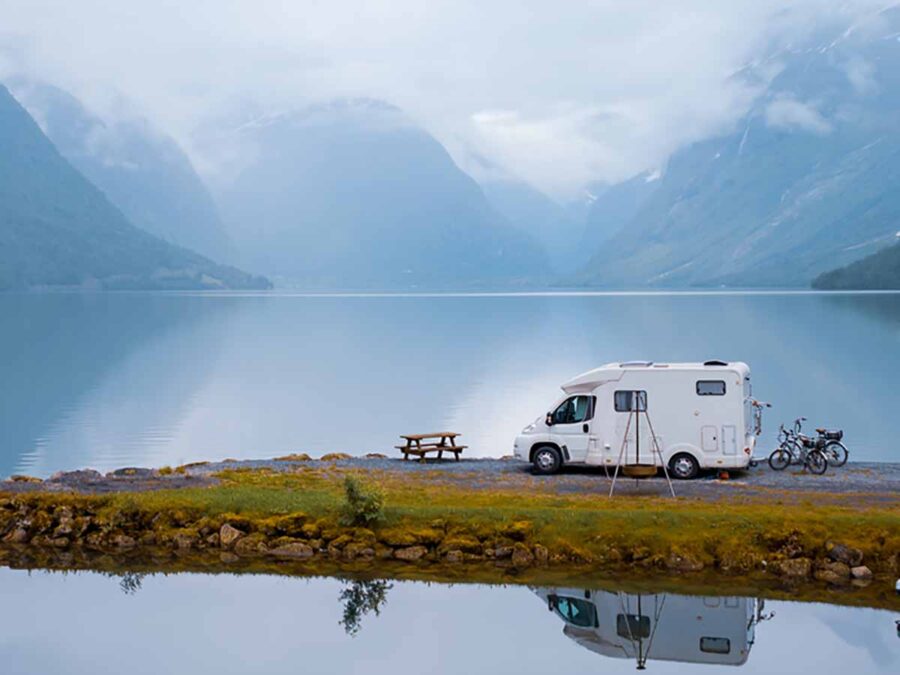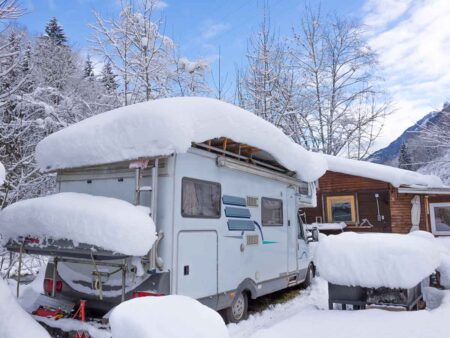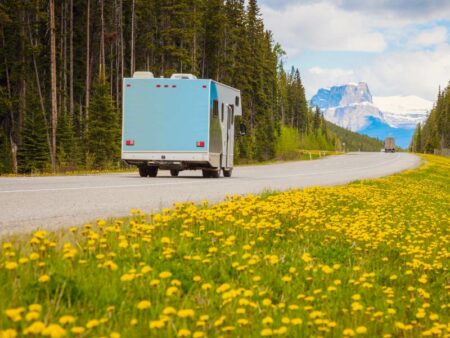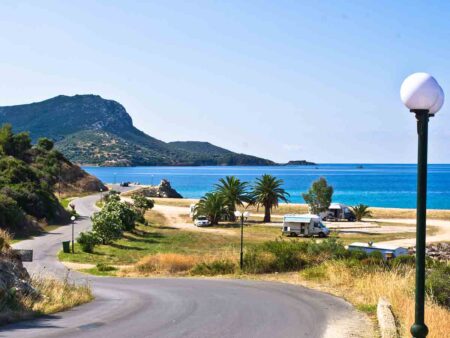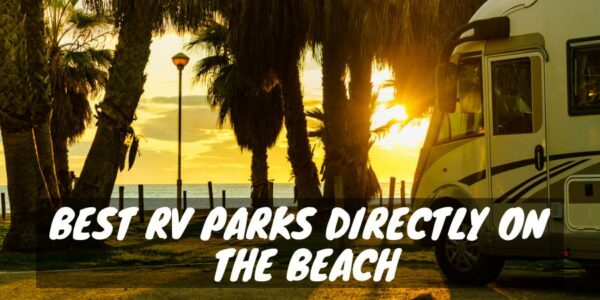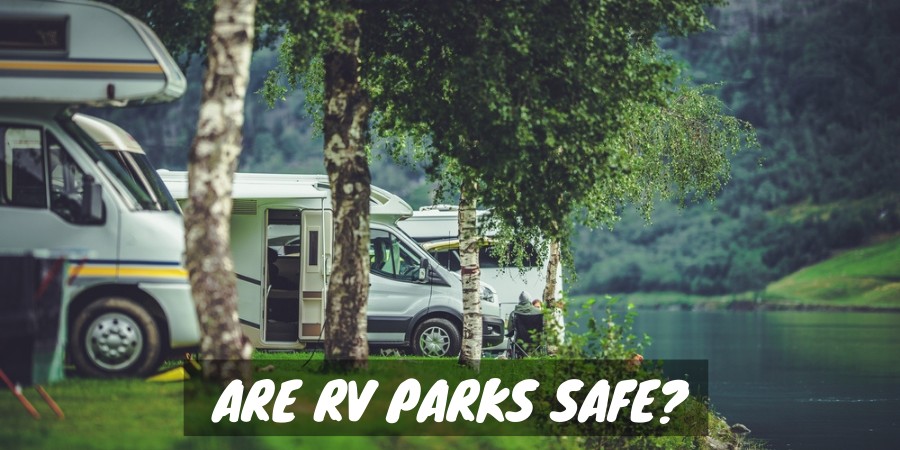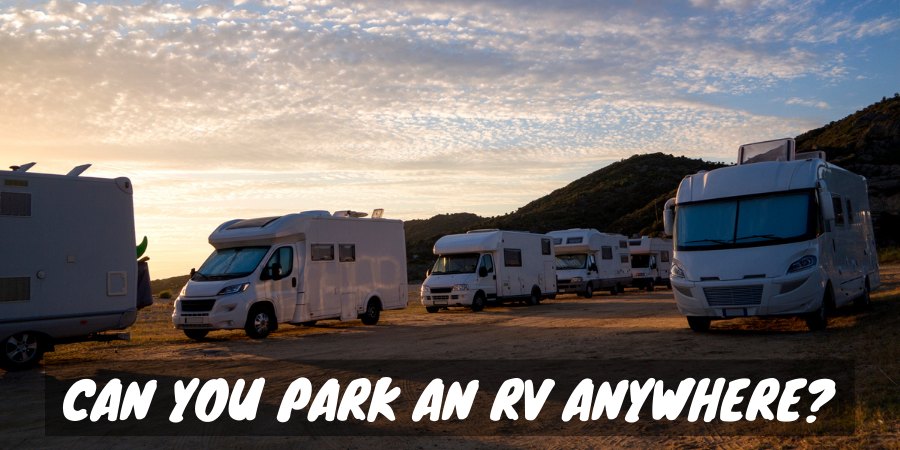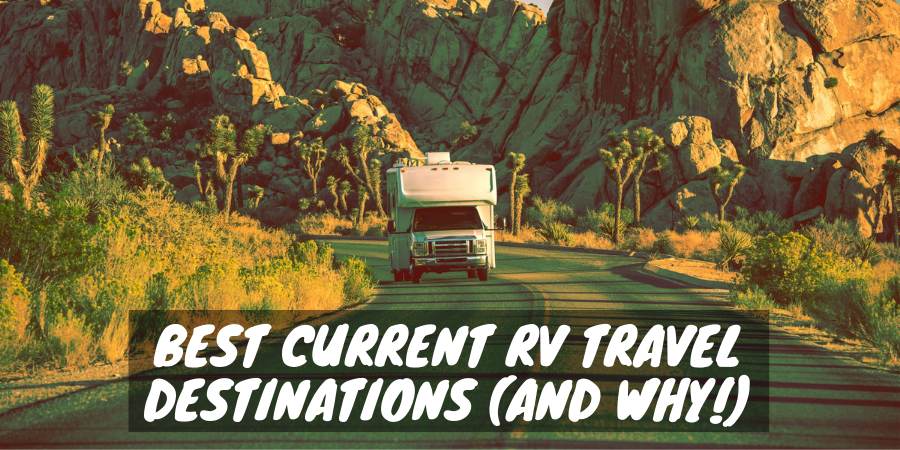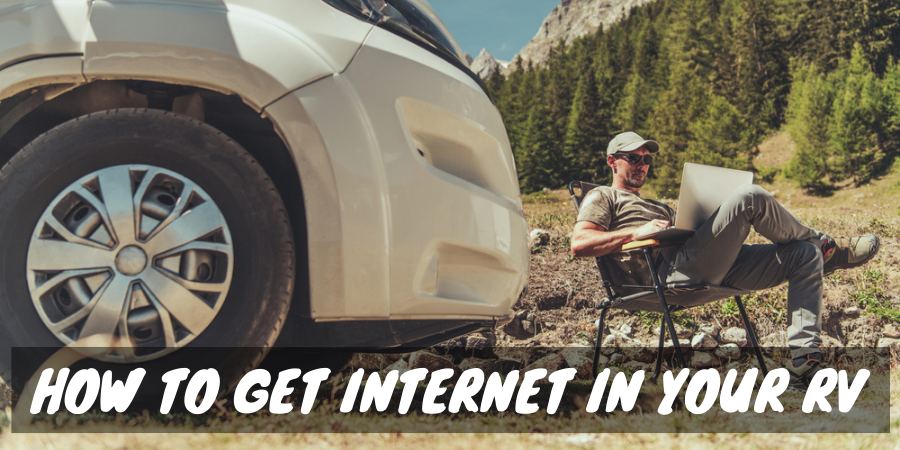Camping is all about new experiences, but which is better, camping on the beach or in the mountains? Everyone should try beach and mountain camping because they offer unique opportunities to enjoy the great outdoors.
To help you understand the differences between the two camping locations, we put all the details in this article.
By the end, you’ll know which camping location suits your vacation style best, efficiently plan your next mountain or beach camping excursion, and try one of the top-rated campgrounds we highlight below.
Benefits of Beach Camping
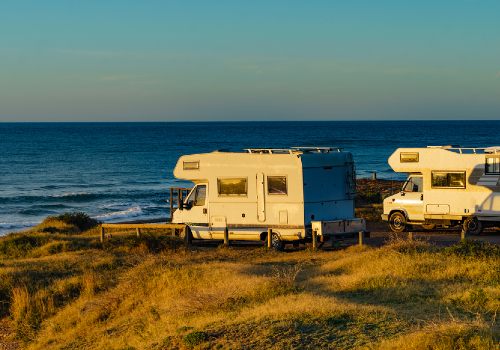
Beach camping along any of the US coastlines is a way to experience and explore the sand and water at all times of the day and night, giving you a chance to see things you’ve never been able to before.
Of course, the sunrises and sunsets over the vast expanse of the ocean will be an unforgettable spectacle, with the colors reflecting off the water to enhance the show even more.
While spending each day enjoying swimming, snorkeling, watersports, sunbathing, or fishing is a top draw of beach camping, it’s those off-hours when the day visitors go home that make it truly special.
Beachcombing early morning or late evening increases the chances of finding that perfect shell, sea glass, or driftwood.
The quiet hours are also when you’ll spot more wildlife, such as sea turtles, stingrays, dolphins, fish, birds, and crabs.
Lastly, spending days following the ebb and flow of the tides creates a peaceful vibe, only made better by the smells of the salty air and the sounds of the waves lapping the shore.
Beach Camping Prep
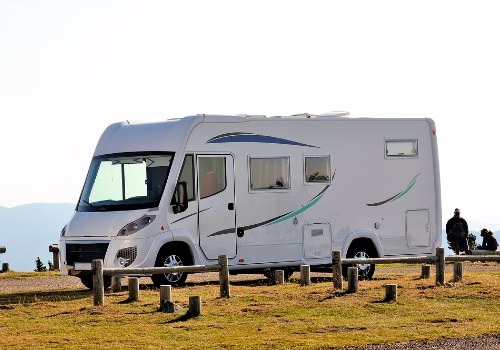
State or county regulations often limit sewer hookups or electricity and water connections near coastlines for safety or environmental reasons. Since most beachfront campgrounds are within state or national parks, expect the campsites to be more rustic.
While some campsites may border the beach, most will require a short walk to reach the shoreline. Since a day on the beach entails chairs, coolers, umbrellas, beach toys, and more, think about how you plan to get these items back and forth with the least amount of stress.
Do your research on what a beachfront campground offers in terms of bathrooms, showers, water, power, trash bins, and proximity to the local grocery store for supplies. Packing needs can vary widely depending on what the campground provides.
If you plan to beach camp in an RV, check if the facility has a dump station on site, as we’ve found many that do not.
Lastly, prepare for sun exposure and the possibility of bugs or dangerous wildlife in and around your campsite.
Southern beach campgrounds often have snakes, alligators, mosquitoes, no-see-ums, and flies that can be a nuisance during specific parts of the day or year.
Western beach campgrounds can be visited by bears, mountain lions, or other large predators that can attack or steal your food.
Call and ask campground staff what to expect in terms of dangerous wildlife, insects, and weather so you can plot the best way to handle each issue before you arrive.
Beach Camping Essentials Packing List
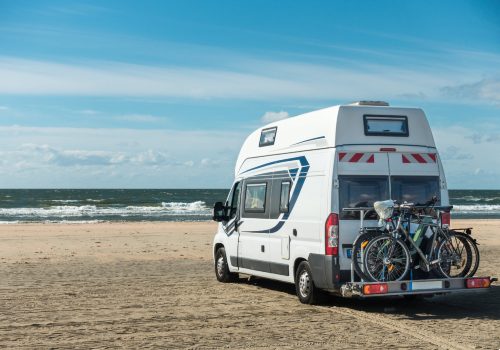
Aside from the “normal” RV or tent camping supplies, these are the essential extras you must pack for beach camping adventures:
- Water, water, and more water
- Sunshades or umbrellas
- Sunscreen
- Thick, strong plastic trash bags and Ziplocs of various sizes
- Baby powder or cornstarch and a soft brush
- Quick-dry beach and body towels
- Collapsible wagon or buggy
- Sunhats, shirts, or other SPF-rated clothing or swimwear
- Beach toys
- Hammock
- Strong tent with great ventilation
- Large plastic totes
- Firestarter
- Water shoes
- High-quality cooler
- Clothesline or folding rack
We can’t express how fast you can go through water on a beach camping trip between staying hydrated and washing off sand and salt or doing dishes. However, if you don’t have access to potable water at your campground, camping experts suggest the minimum is two gallons of water daily for each guest.
Baby powder or cornstarch is an excellent hack for getting stubborn sand off the skin. Just sprinkle it over dry legs or arms and brush it off.
A nasty sunburn will ruin a trip quickly. So, while sunscreen is vital, it’s worth investing in swim hats and shirts with SPF protection made for water that is comfortable to wear during activity.
Walking to the beachfront, hot sand, rocky or shell shorelines, and bathhouse floors require some foot protection. However, skip the flip flops and use water shoes that provide a durable sole with traction that makes walking across rough or slippery surfaces much easier.
Beach camping often involves hot weather and total sun exposure, so your cooler must be up for the challenge. Invest in a top-quality cooler from brands like Yeti, Titan Deep Freeze, RTIC, or Igloo to chill your drinks and food for up to several days on one bag of ice.
Beach Camping Tips
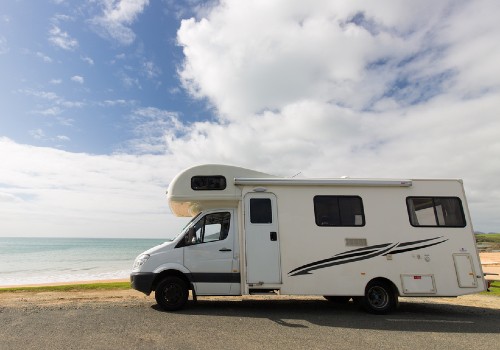
Track Ocean Tides
Tracking the tides will help you know where the best place is to set up each day on the beach so you aren’t scrambling to move all your gear mid-day. We suggest the Tides Near Me app or pick up a tide chart from a ranger station or local bait shop and tuck it into your beach bag. This is why beach camping is an advantage over mountain camping.
While you’re at it, keep watch on the local weather forecast and look to the skies, as pop-up storms frequently occur along coastlines. Lightning is deadly and can happen up to ten miles from a storm’s center, so if you hear thunder, seek shelter immediately.
Use Totes for Rinsing and Waste Storage
Fill a tote with six inches of water and leave it just outside the tent or RV so guests can step in and out to rinse off sandy feet before entering.
Use another tote to hold food waste until you dispose of it in an appropriate receptacle. A tightly clasping lid will hold in smells and deter animals and pests from hanging around.
Choose Bright Beachwear
Keeping track of your kids and family while on the beach can be challenging when crowds arrive, so having everyone dress in bright beachwear is smart.
For safety, we suggest going with a fluorescent green color that studies indicate is the easiest shade to detect underwater, even in low light. Other top colors to consider are neon orange and neon yellow.
Tie Up a Hammock
If you can tie up a fabric hammock at your campsite or up under the canopy of a sunshade, it’s an excellent option to store gear you want to keep out of the sand.
Best Beach Campgrounds
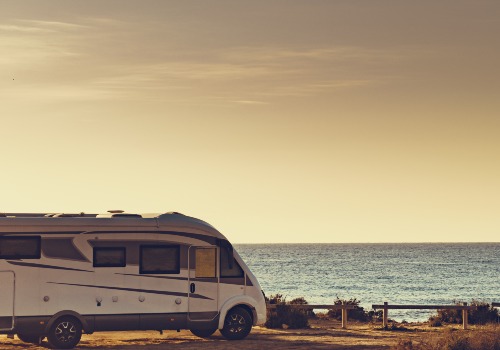
Here is the low-down on some of the best beach camping locations along the US coast:
Hunting Island State Park – Hunting Island, South Carolina
Operating Season: Year-round
Average Nightly Rate: $60
Campsites: 117 RV and tent w/electric and water, with rustic campsites available
Hunting Island State Park provides access to the most beautiful stretch of sand found in the state yet places the campsites in a wooded area that provides plenty of shade after days in the sun.
Hunting Island State Park (Video)
Henderson Beach State Park – Destin, Florida
Operating Season: Year-round
Average Nightly Rate: $38
Campsites: 60 RV and tent w/electric and water (Dump station on site)
Henderson Beach State Park campground is a gem found in the Panhandle, where the emerald waters and sugar-white sands are considered the best in the US. This campground offers wonderfully private campsites a short walk from the shore yet near all the action of Destin.
Dockweiler RV Park – Playa del Ray, California
Operating Season: Year-round
Average Nightly Rate: $70
Campsites: 188 Full or partial hookups RV only
Dockweiler RV Park puts the sand, amazing views, and a 22-mile bike path that accesses Redondo Beach Pier, Marina Del Ray, Venice, and Santa Monica on your doorstep.
Sea & Sand RV Park – Depoe Bay, Oregon
Operating Season: Year-round
Average Nightly Rate: $70
Campsites: 114 FHU RV only
The Sea & Sand RV Park is a lovely terraced oceanfront campground, with beachcombing enthusiasts and fisherpersons raving about the location.
Sea and Sand RV Park (Video)
South Beach Campground – Jefferson County, Washington
Operating Season: May 20 through September
Average Nightly Rate: $20
Campsites: 55 RV or tent – no hookups/rustic – First-come, first-served
South Beach Campground is part of the Olympic National Park and places you in the heart of a pristine natural setting, unlike other beach camping locations.
Benefits of Mountain Camping
Mountain camping provides many benefits you won’t find at the beach, starting with cool, shady campsites often far from your neighbors.
Mountain campgrounds also put you within reach of miles of hiking trails that feature ever-changing terrain and plant life, rivers, waterfalls, lakes, and ponds that give you a serene feeling and an oasis to relax.
All the trees and plant life also add an abundance of fresh oxygen to the air, making you feel energized yet calm. The enjoyable scents of pine, foliage, flowers, and water also seem more intense in the mountains.
The views from mountain campsites are panoramic, with scenery you can see for miles both outward and down to the lower elevations. Photographers find this perspective gives them a chance to catch incredible shots, especially at sunrise or sunset.
Wildlife also abounds in the mountains, so you’ll have tons of opportunities for birdwatching or catching a glimpse of deer or other forest creatures.
Mountain Camping Prep
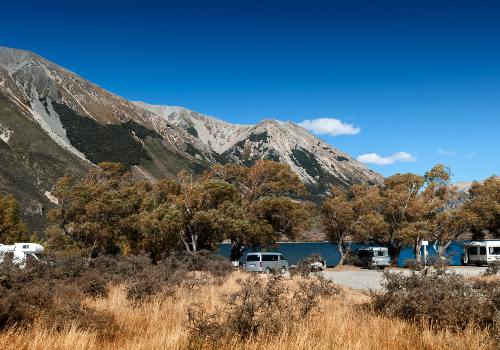
It helps to be aware that most, if not all, mountain camping locations are within state or national parks. This fact means that RVers will find it rare to have full hookups at their campsite, and there may be camper length restrictions.
Both tent and RV camping guests will find rustic restroom facilities, often with pit toilets versus flushing toilets and no hot showers.
Another thing to prepare for is seasonal closures. Mountain regions get hit by more extreme weather and colder temperatures, so it’s common for campgrounds to be closed from late fall through early spring.
Mountain camping, but usually not beach camping, also entails possible encounters with dangerous large wildlife like bears, wolves, coyotes, cougars, mountain lions, or deer that will be especially on edge during mating season or when babies are young.
Mountain Camping Essentials Packing List
These are the essential extras you must pack for mountain camping adventures:
- Spare batteries or portable power station
- Compass
- All-weather jacket
- Backpack with comfortable straps
- Durable tent with rainfly
- Bug spray
- Biodegradable soap
- Firestarter
- Flashlights
- Water filters or purification tablets
- Rope or paracord
- Hiking boots or shoes
Mountain camping puts you at a higher elevation, where the weather can turn from hot and sunny to cold and rainy on a dime. Therefore, always carry a lightweight rain jacket with a warm lining to avoid exposure to harsh weather.
Hiking is a mountain camping favorite, so having a comfortable backpack is essential to keep food and supplies handy.
Potable water is another concern, as carrying water is heavy, or you can get lost and run out before help arrives. Bringing along a LifeStraw or water purification tablet can mean the difference between life and death in remote mountain regions.
Mountain Camping Tips
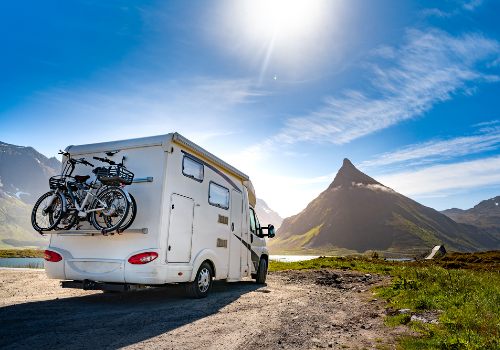
Pack Extra Rope
The rope is a must-have item for hanging clothes to dry, lifting food packs off the ground to keep them away from animals, securing tents, bundling firewood to haul back to camp, and so much more. Several thin, strong paracord ropes are lightweight yet invaluable for many mountain camping situations. Keep this in mind if you wonder about the beach or the mountains for options.
Pack Potassium
Higher elevations tend to aggravate the body, especially when hiking. Keeping hydrated helps keep muscles working, but cramps can occur without extra potassium.
Want to Connect With a Community of Over 1,078 RV Enthusiasts?
Bringing along bananas is fine but isn’t very practical. The solution is to pack potassium supplements to prevent muscle weakness, soreness, or cramping before it starts.
Don’t Forget to Apply Sunscreen
Higher elevations make it easier to get a sunburn, even if you think the shade of trees gives you protection. So not only should you apply a high-SPF sunscreen each day, but you should also invest in good sunglasses to protect your eyes from UV damage.
Best Mountain Campgrounds
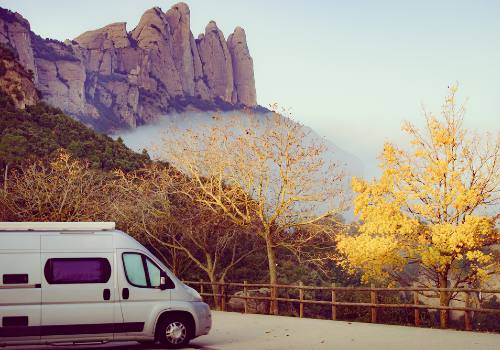
Moreau Lake State Park – Gansevoort, New York
Operating Season: May through November
Average Nightly Rate: $25
Campsites: 145 RV or tent – water/electric or rustic
Moreau Lake State Park is an ideal lower-elevation mountain camping location that offers a lake, miles of hiking trails and unusual rock formations. This mountain location beats beach camping by far.
Mount Mitchell State Park – Burnsville, North Carolina
Operating Season: May through October (tent sites)/Backpacking sites also available
Average Nightly Rate: $17
Campsites: 9 rustic tents/unlimited backpack camping
Mount Mitchell State Park is one of the first state parks in the US and gives tent campers who love to hike and climb a chance to summit the highest peak found east of the Mississippi River or backpack camp in the Pisgah National Forest.
Mount Mitchell State Park (Video)
Salmon Lake State Park – Seeley Lake, Montana
Operating Season: May through September
Average Nightly Rate: $18
Campsites: 33 RV or tent – rustic or partial hookups
Salmon Lake State Park sits along the Clearwater River and offers serious hikers a chance to test their skills at the 9,356-foot ascent to take in the amazing views. The terrain in this park is varied, stunning, and ideal for photography.
Thomas Mountain Yellow Post Camping – Mountain Center, California
Operating Season: Open all year, but access is often restricted
Average Nightly Rate: $0 – First-come, first-served
Campsites: 5 rustic – Tent, campervan, or small RV accessible (4WD highly recommended)
Part of the pretty San Bernardino National Forest, the Thomas Mountain Yellow Post campsites are unique, remote locations often hard to reach, but are worth the sheer serenity of mountain camping away from civilization.
Milo McIver State Park – Estacada, Oregon
Operating Season: Year-round
Average Nightly Rate: $26
Campsites: 53 RV or tent – rustic or partial hookups
Milo McIver State Park is an excellent mountain camping location for families or outdoor enthusiasts who will appreciate access to trails, water sports, fishing, and exciting terrain, from volcanic steam eruptions to thick forest hammocks.
Mountain Camping vs. Beach Camping Wrap Up
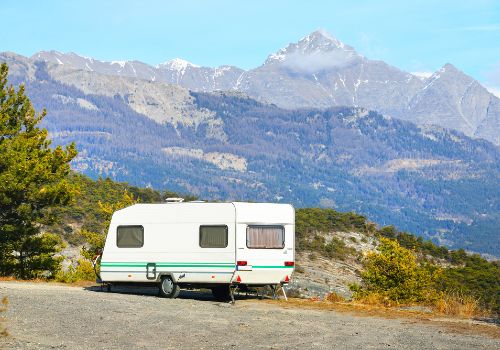
If you love camping, you’ll find beach and mountain locations that offer a diverse range of activities and sights, making each a unique and memorable experience.
We hope you use this guide to plan an RV trip or tent camping adventure to one of our top beach or mountain campgrounds and use the lists and tips to make your visit safe and pleasant.
Whether you choose waves or high-elevation wilderness, you can’t go wrong with enjoying the wonders of nature!
Related Questions
- What are the unique benefits of beach camping as compared to mountain camping?
Beach camping offers unique benefits, such as the opportunity to enjoy water-based activities like swimming, surfing, and fishing and the soothing ambiance of the ocean waves and sunsets.
On the other hand, mountain camping provides a different set of advantages, including cooler temperatures, challenging hikes with rewarding views, and the chance to observe diverse wildlife and flora not found in coastal areas.
- What are some essential items to pack for a beach camping trip?
For a beach camping trip, it’s essential to pack items like a sturdy tent, sleeping bags, beach chairs, sunscreen, insect repellent, a cooler with food and drinks, and a first-aid kit.
Don’t forget beach-specific items like swimwear, towels, beach umbrellas, water shoes, snorkeling gear if you plan to explore underwater, and a beach blanket for lounging on the sand.
- Can you provide some tips for a successful beach camping experience?
For a successful beach camping experience, it’s crucial to choose a campsite with natural shade and away from high tide lines, and always check the weather forecast to avoid any storms or high winds.
Pack essentials like a sturdy tent, sunblock, bug spray, plenty of water, food, and a first-aid kit, and remember to respect the environment by cleaning up your campsite before you leave.
- What are the advantages of mountain camping over beach camping?
Mountain camping offers a unique experience with diverse landscapes, opportunities for hiking, and cooler temperatures, which can be a respite during the hot summer months.
On the other hand, beach camping often involves dealing with sand getting everywhere, the potential for more crowded conditions, and hotter temperatures, but it lacks the elevation changes and solitude that mountain camping can provide.
- What are some essential items to pack for a mountain camping trip?
For a mountain camping trip, it’s essential to pack items for survival and comfort in the outdoors, including a sturdy tent, sleeping bag, hiking boots, warm clothing, a first-aid kit, a map or GPS, a headlamp or flashlight, and food and water supplies.
Don’t forget items for cooking and eating, such as a portable stove, fuel, utensils, and a water purifier, as well as tools like a multi-tool or knife, rope, and a fire starter for emergencies.
"Man cannot discover new oceans unless he has the courage to lose sight of the shore."
-- Andre Gide

